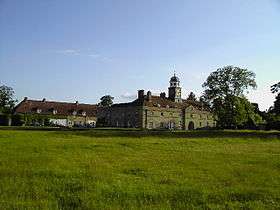Wandlebury Hill
| Wandlebury Hill | |
|---|---|
 The stable block at Wandlebury House | |
| Highest point | |
| Elevation | 74 m (243 ft) |
| Prominence | 10 m (33 ft) |
| Parent peak | Great Wood Hill |
| Coordinates | 52°09′31″N 0°10′57″E / 52.158611°N 0.1825°ECoordinates: 52°09′31″N 0°10′57″E / 52.158611°N 0.1825°E |
| Geography | |
| Location | Gog Magog Downs, England |
| OS grid | TL493533 |
| Topo map | OS Landranger 154 |
Wandlebury Hill (grid reference TL493534) is a hill in the Gog Magog Downs, a ridge of low chalk hills extending for several miles to the southeast of Cambridge, England. The underlying rock is present in a number of places on the hill. At 74 m/243 ft it is the same height as the nearby Little Trees Hill, although the latter is a more notable landmark.
The top stands in Wandlebury Country Park, a nature reserve owned by Cambridge Past Present and Future, formerly known as Cambridge Preservation Society. Wandlebury was already inhabited in the Bronze Age[1] and 2500 years ago there was an Iron Age hill fort here known as Wandlebury Ring. This hill fort once had concentric ditches and earthen walls which were kept in place by wooden palisades. Although the fort has vanished, the ditch (the Ring) dug around the edge can clearly be seen and walked along, being 5 metres deep in places and offering an adventurous route along its edge. There is no evidence that it was ever used in defence. Wandlebury House, home of among others, Francis Godolphin, stood within the Ring. The house has been demolished but the monumental stable block remains, now used for accommodation and as headquarters office of Cambridge Past Present Future. The grave of the Godolphin Barb horse, which died in 1753, can be seen under the archway. Maps and leaflets are available from the porch at all times and from a shed in car park on summer Sundays. The tail of a crashed World War II Wellington Bomber was visible wedged high in a beech tree within the estate, until it was dislodged by strong winds in the early 1990s.
The reserve, mainly beech woodlands and fields, is a place for birdwatching and a place for an early morning stroll. Banyard bird hide, overlooking Varley's Field, was completed in February 2012. Like Little Trees Hill, the summit is on public land and is accessible when sheep or Highland cattle are not in the field. Dogs must be on a lead everywhere in Wandlebury Country Park. It can be reached by walking across the field from post 3 of the nature trail. Virtually no climb is involved in the ascent, just a stroll through woodland.
References
- ↑ Over the Hills to Cherry Hinton, H. C. Coppock, 1984, Plumridge, Linton, Cambridge, p.14.
External links
- The Prehistoric Society on Bronze Age ritual activity
- Map published in 1891
- Cambridge Past and Present (formerly the Cambridge Preservation Society)'s page about Wandlebury
See also
- Wandlebury Enigma
- List of hill forts in England
- List of hill forts in Scotland
- List of hill forts in Wales